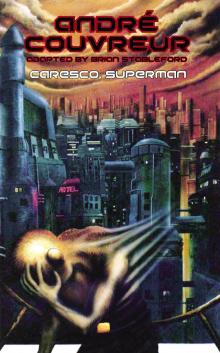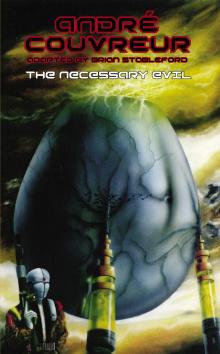- Home
- André Couvreur
The Exploits of Professor Tornada (Vol. 2)
The Exploits of Professor Tornada (Vol. 2) Read online
André Couvreur
The Exploits of Professor Tornada
Volume 2:
The Phosphorescent Waltzer
The Memoirs of an Immortal
translated, annotated and introduced by
Brian Stableford
A Black Coat Press Book
TABLE OF CONTENTS
Introduction 4
THE PHOSPHORESCENT WALTZER 8
THE MEMOIRS OF AN IMMORTAL 138
FRENCH SCIENCE FICTION & FANTASY COLLECTION 261
Introduction
“Le Valseur phosphorescent” by André Couvreur, here translated as “The Phosphorescent Waltzer,” was originally published in Oeuvres Libres no. 30 (December 1923). “Les Mémoires d’un immortel” was originally published in Oeuvres Libres no. 42 (December 1924). Neither story was ever reprinted in book form, although Couvreur had apparently signed a contract with Albin Michel, who had published the book version of the first novella featuring Professor Tornada to appear in Oeuvres Libres, L’Androgyne (1922),1 to publish three more.
It is not obvious why Albin Michel did not follow through with that contract, as “Le Valseur phosphorescent” is similar in kind and style, including its perversely prurient erotic content, to its predecessor. Perhaps L’Androgyne had not performed as well as expected in the marketplace, or perhaps the rethink was occasioned by a general backlash in that marketplace against speculative fiction, which affected several of the authors attempting to resurrect their careers in that genre following the interruption of the war. At any rate, none of the remaining stories that Couvreur published in Oeuvre Libres—including two other novellas as well as the remaining stories featuring Professor Tornada—ever achieved book publication, until now.
The hypothesis that it might have been the erotic content of “Le Valseur phosphorescent”—which, although relatively mild, is in calculatedly bad taste—that put Albin Michel of is supported by the fact that such content was drastically reduced in the remaining Tornada stories, which show much greater restraint and adopt a more conventional decency in their representation of the workings of lust. The crude voyeurism and obsessive prurience credited to Tornada here never recurs in his subsequent incarnations, although he does remain sexually active in “Les Memoires d’un immortel.” In fact, the character underwent a drastic change in between the two novellas translated in the present volume, just as he had in between the two items translated in the previous volume in the series.
In his first incarnation, in Une Invasion de Macrobes (1910),2 Tornada had been a slightly pathetic figure, so unhinged by the death of his beloved wife and daughter as to be unable to withstand the blow to his esteem of being rejected by the Académie by jealous rivals. Intent on revenge, he had unleashed his macrobes—gigantic flesh-eating bacteria immune to the assaults of artillery and high explosives—on the city of Paris, intent on smashing it flat and obliterating it population. When he returned after the Great War however—somewhat miraculously, given that neither he nor the city to which he returned had survived the macrobe invasion—he came back physically similar, save for the mesmeric phosphorescence of his beard, but psychologically transmuted, carrying forward a project that had been mentioned en passant in Couvreur’s previous erotically-charged scientific romance, Caresco, surhomme (1905)3, and being credited with Armand Caresco’s extraordinary surgical skills in order to do it.
Although the Tornada featured in “Le Valseur phosphorescent” no longer has a mesmerically-talented beard—or, indeed, any beard at all—and makes scant use of his surgical skills, he is nevertheless carrying forward another of Caresco’s projects—this time, one in which even Caresco could not make much headway. As in L’Androgyne, he remains distant from the story’s viewpoint character, essentially isolated from human society, save for that of a bizarre assistant who has certain similarities to Caresco’s mysterious assistant Dr. Hymen. He is, in effect, a quasi-demonic outlaw no longer able to employ his own name, so tainted has it been by past endeavors (although these do not appear to have included sending macrobes to smash Paris).
The Tornada who reappears in “Les Memoires d’un immortel,” bearded once again, is a markedly different character, impish rather than demonic, in receipt of the esteem of his fellow Parisians, who recognize and admire his genius. More than that: he has a friend, whom he has known since their college days, and with whom he maintains a relationship of amity in spite of the fact that the individual in question is a complete idiot, and a writer of poetry and plays sufficiently pretentious to make him a convincing candidate for the Académie. He does however, have a young daughter, which inevitably appeals to Tornada’s one consistent weak spot, and which leads Tornada to use him as a experimental subject in a genuine spirit of generosity—although, admittedly, Tornada is the kind of friend that might cause a man to feel that he has to need of enemies, and exhibits the kind of helpful generosity that might make one yearn for miserly indifference.
Although both the stories included here—and, indeed, the entire Tornada sequence—are comedy melodramas, there is a marked difference in the tone of their wit, the latter being much lighter. Given the brief interval between their publication dates, that seems slightly surprising, and it is conceivable that “Le Valseur phosphorescent” had been drafted much earlier—perhaps before L’Androgyne, perhaps during, or even before, the Great War, and perhaps originally featuring a protagonist who was only belatedly assimilated to the character of Professor Tornada. Whether or not that is true, the Tornada of “Les Mémoires d’un immortel” is much more similar to the Tornada of the final two novellas in the series, included in the third volume of the present set—“Le Biocole” (1927; tr. as “The Biocole”) and “Le Cas de baronne Sasoitsu” (1939; tr. as “The Case of Baronne Sasoitsu)—in each of which Tornada generously comes to the aid of an old friend, aided by the enormous social esteem in which he is held. Maintaining the paradoxicality of the sequence, however, the two final novellas are just as inconsistent with one another as the members of the first two pairs.
Whatever their origin, and whatever the true explanation is of the abrupt shift in Tornada’s character between them, the two novellas translated herein are united in similarity by forcefully flamboyant plotting, sharp wit and ingenious biological improvisation. They are among the finest examples of the speculative fiction of their period produced anywhere in the world, and it is a pity that their restriction to periodical publication restricted their readership and reputation; they certainly do not warrant the relative obscurity into which they fell prior to attention being called to them by complimentary coverage in Pierre Versins’ Encyclopédie de l’utopie, des voyages extraordinaires et de la science-fiction (1972).
These translations have been made from the London Library’s copies of Oeuvres Libres nos. 30 and 42.
Brian Stableford
THE PHOSPHORESCENT WALTZER
(An extract from the memoirs of a beautiful
but poor woman, concerning her marriage)
I
I pity people who don’t know the Basque coast, and more particularly Saint-Jean-de-Luz Bay. An occasional sojourn in that magical land would compensate them for the troubles of life. It would permit them to wait without impatience for their passage to a better world—unless one passes into oblivion, which is still a subject of controversy.
Personally, after having rolled my lump around the world somewhat—I use the singular out of respect for the current expression4, but know that I’m twenty-two years old and that nature has endowed me sumptuously with that of which the Amazons lacked half—and after having admired many shores from the Far East to the Far West, I remain fanatical a
bout that enchanting location, and I used to spend vacations there as often as my modest resources permitted.
I love the peaceful fluidity of the atmosphere in that region, the soft warmth of the sand, the discreet voice of the waves. I love the décor of the villas, the hotels along the beach, the elegant frame of Ciboure to the left and the cliffs of Saint-Barbe to the right. I love idling through the tortuous, scarcely-paved streets, in which every house religiously preserves the local character. I also love the bronzed, slimly-built people, and the proud upright posture of the women when they walk—which they have apparently inherited from their ancestors, who used to carry burdens on their heads. I also love the elegant company that animates the resort from July to the end of September, in competition with the vogue for Biarritz. Finally, I love the Pergola, the embryo of a vast casino interrupted by the war, where one can dance, drink, eat and tempt fortune gambling.
I am not one of those morose individuals who attribute the outgoing tide not to astral influences but to the disgust the sea experiences on seeing so many people assembled on its shore, dancing so comically, chattering so idly, guzzling so gluttonously and ruining themselves so stupidly. The waves, such people jest, are recoiling in horror. Good for the waves! They are, however, very indulgent, since they soon come back again...
And I love, I love that vain crowd and that joyous refuge!
Well, it was in the Pergola, enfevered that evening by a costumed ball, that I experienced the most disappointing emotion of my youth.
I’m an orphan; my father’s career as a diplomat dragged me all over the world and brought me into contact with various civilizations, with all the instruction that results, for a child’s intelligence, from the spectacle of mores in which, in some latitudes, it is immoral to show one’s face, whereas in others, it is the face and upper body that one exposes proudly while hiding the rest. In spite of the domination that I had achieved over my nervous system by virtue of that nomadic existence and the philosophy with which I had become accustomed to accepting the surprises of life, yes, I experienced that evening my first true chagrin, and, as I am also impetuous by nature, my first authentic revolt.
What! That was the way that the friend whom my virginal heart already considered as the master of my destiny slipped away! No promises had been made, it is true, either by him or by me; no definitive word had been pronounced. He was still able to consider himself free, although I had pledged myself to him a long time ago. But is it not gazes, attentions, anxieties and the very sound of the voice that obligate you, as much as promises and oaths? How could I suppose that Marcel would greet with such indifference the propositions I had just made to him? What a disillusionment!
I thought that he might respond to the confidence with the amusing flippancy with which he is able to demolish people who do not please him; I even thought that he might take advantage of it finally to declare the affection that his entire being had betrayed since the beginning of our friendship. Far from it; his eyes remained calmly attached to the movements of the dancers; he continued, with a hand lightly applied on the back of my chair, to beat the measure of the fast-paced shimmy to which a few couples were swinging their hips beneath the enchantment of the multicolored chandeliers.
“Did you understand what I said, Marcel?” I said, twisting my fan.
“Perfectly, my dear Made.”
“And is that all that you have to say in reply?”
“My God, what do you want me to say?”
“I hoped at least for some advice, dictated by the interest that you have taken in me for two years.”
“Oh, advice is dangerous, when it’s a matter of something as serious as marriage.”
“And you don’t like danger...” I said, ironically, although my voice was tearful.
“I fear it, like any human being.”
“Even when it might be a matter of saving my future? Oh, Marcel, I thought you were nobler!”
My reproach provoked a reaction in him that I was no longer expecting. He turned his head away, so that I would not be able to glimpse his tenderness—but I had divined it. What secret, incomprehensible force, then, opposed his heart to its determination?
“Let’s speak clearly,” he said, very softly, in order to attenuate in advance the pain that he was about to cause me. “You’re twenty-two years old; you’re pretty, intelligent, cultivated and more fully-informed about amorous matters than all these young women surrounding us, who nevertheless hide behind their precious candor an already-experienced knowledge. Unlike them, and fortunately for you, you’ve been able to remain sheltered from the demon; you refrain from listening, like some of these we can see at this moment, to the whispers of dancing-partners and responding to them with a smile that speaks volumes. Yes, for you, flirtation is a petty vice; you want to remain irreproachable by the only man that you will love.
“But who might that man be? For, along with all the real qualities with which I’ve just credited you, Made, I must admit that you have one serious defect: you are, essentially, a creature of luxury. Your habits, the result of your education, of the comfortable situation of your lamented father, necessitate that you wear lovely dresses; that your feet should be clad in good quality stockings and shoes; that an automobile should be waiting for you during all your visits; that your boudoir should be furnished with antiques and carpeted in silk; and you don’t hesitate when it’s a matter of a few large-denomination bills for a fashionable fur.
“Yes, for you, all that ostentation and all those refinements are not special: they’re necessary and compulsory. But you have no fortune, my dear Made! I can’t see you, from now on, shaping the mediocrity of a man who only has intelligence enough to earn a living in this society enslaved by shopkeepers and boxers. You, the wife of an advocate, a physician, an artist or a scientist? You, obliged to renounce the pomp that is dear to you, to manage a household, to haggle with suppliers, skimp on nourishment, help out the one and only maid and change the children’s nappies, if there are any? Get away!”
“Oh!” I protested, wounded by the fact that he doubted my courage. “With all my heart, for the man I love...”
“Yes,” he agreed, “with all your heart…but you’d suffer from it, Made, and a true friend couldn’t demand it of you. It would be to immolate you—and at length, your love would lose its wings. You ought not to suffer, Made, and you shouldn’t! I’d be the first to be unconsolable. So I say to you: listen with more favor to this offer, unusual in our era even for an elite creature like you. Although its advantages are indisputable, I’d like to point them out to you.
“Let’s first examine the young man together. We have him in sight now. There he is, offering his hand to Mademoiselle de Laricarière, who is starting to dance a waltz with him. He dances badly; he dances impetuously; but he’s handsome. With his straight nose, his rounded oval face, his wide eyes, yes, he’s as handsome as an antique—classically handsome, with all the beauty of which Phidias left immortal memories. His dentition is possessed of the most Oriental purity. His harmonious muscles, his supple articulations, his powerful torso and his arched lower back make him one of the most veritably enviable specimens of our epoch.
“Furthermore, his elegance, his good manners, his courtesy and his simplicity recommend him even more to mothers in search of a son-in-law for their daughter. I’m sure that Mademoiselle de Laricarière would take him on. See how she’s smiling at him already, how her cheek is inclining toward him, how flexible her waist is becoming—too flexible, even—in order to abandon itself to her partner’s pressure…but she’s wasting her time. He only has eyes for you. It’s you he loves, you he wants to make his wife.
“And he’s madly rich, Made! His father, Monsieur Danator, has made an enormous fortune in Argentina. I wonder, in that regard, how a man like that, so impassioned by medicine, physics, chemistry and transcendental science could have had enough practical sense to build an extraordinarily profitable business. I’m also suspicious of his past, for
those who, starting from nothing, rapidly acquire a fortune are usually adventurers of whom it’s necessary to be suspicious. They leave cadavers in their wake; their purse-strings, before tying up their profits, have strangled more than a few innocents…but no, Monsieur Danator père isn’t an adventurer. All his transactions have been above board. He can even be considered an honest man.
“He’s taken an interest in a thousand successful enterprises, by virtue of his intelligence. His recent discovery of naphtha mines in the Urals, on land that he bought for less than six francs a hectare in our money, no longer permit his wealth to be calculated. One can only be astonished that a man so strangely devoid of grace has been able to produce such a magnificent child. His wife must be very beautiful, and very close to nature. The poor woman died in an accident, it appears. She was electrocuted after being moved by curiosity to touch a powerful electrical machine used by her husband in his experiments...
“Why, I only have to look at the Villa of the Immaculate Conception that he’s built out there beyond Ciboure, to regret that his son isn’t a daughter and that I lack the gifts that favor you. I wouldn’t hesitate for a moment! I’d sell my heart and all the rest to know…yes, to know...”
“To know what?”
My friend Marcel Germaud did not reply. He made an evasive gesture, and I was all the more reluctant to press him to complete his train of thought because I was atrociously wounded by his advice. Moreover, our attention was captured at that moment to Monsieur Danator père. He was sitting at a table alone, a short distance away from us, on the edge of the dance-floor—the place that he normally adopted in order not to lose sight of his son. He chaperoned his offspring like a doting mother, which inevitably made him the butt of the bathers’ jokes.

 Caresco, Superman
Caresco, Superman The Exploits of Professor Tornada (Vol. 2)
The Exploits of Professor Tornada (Vol. 2) The Necessary Evil
The Necessary Evil The Exploits of Professor Tornada (Vol. 3)
The Exploits of Professor Tornada (Vol. 3)